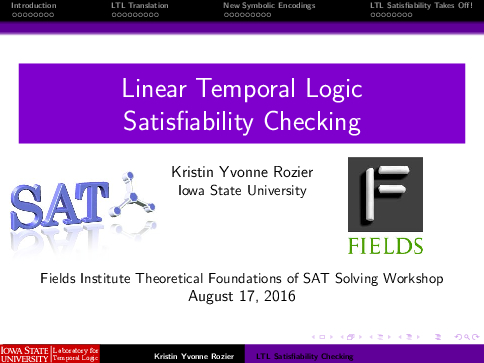 The Fields Institute for Research in Mathematical Sciences hosted an invitation-only Workshop on Theoretical Foundations of SAT Solving August 15-19, 2016. This workshop explored one of the most important problems in all of mathematics and computer science: the Boolean satisfiability (SAT) problem. The workshop focused on the state-of-the-art research developments in Boolean satisfiability, the quintessential NP-complete problem. While SAT is believed to be intractable in general, researchers have contributed dramatic developments in algorithmic techniques in solving SAT during the last two decades. Modern SAT solvers can now solve large real-world instances obtained from wide-ranging applications such as hardware and software verification, electronic design automation, artificial intelligence, bioinformatics, and operations research; these advances were featured in the workshop’s seminars, available online. The workshop was organized by eight of the most prominent researchers in SAT: Vijay Ganesh – University of Waterloo (Lead Organizer); Armin Biere – Johannes Kepler University; Sam Buss – University of California, San Diego; John Franco – University of Cincinatti; Holger Hoos – University of British Columbia; Jakob Nordström – KTH, Royal Institute of Technology; Alasdair Urquhart – University of Toronto; Moshe Vardi – Rice University.
The Fields Institute for Research in Mathematical Sciences hosted an invitation-only Workshop on Theoretical Foundations of SAT Solving August 15-19, 2016. This workshop explored one of the most important problems in all of mathematics and computer science: the Boolean satisfiability (SAT) problem. The workshop focused on the state-of-the-art research developments in Boolean satisfiability, the quintessential NP-complete problem. While SAT is believed to be intractable in general, researchers have contributed dramatic developments in algorithmic techniques in solving SAT during the last two decades. Modern SAT solvers can now solve large real-world instances obtained from wide-ranging applications such as hardware and software verification, electronic design automation, artificial intelligence, bioinformatics, and operations research; these advances were featured in the workshop’s seminars, available online. The workshop was organized by eight of the most prominent researchers in SAT: Vijay Ganesh – University of Waterloo (Lead Organizer); Armin Biere – Johannes Kepler University; Sam Buss – University of California, San Diego; John Franco – University of Cincinatti; Holger Hoos – University of British Columbia; Jakob Nordström – KTH, Royal Institute of Technology; Alasdair Urquhart – University of Toronto; Moshe Vardi – Rice University.
The related topic of Linear Temporal Logic Satisfiability builds on advances in SAT in many ways. Professor Kristin Yvonne Rozier contributed a talk on Linear Temporal Logic Satisfiability Checking exploring this relationship with aerospace domain examples.

Abstract:
One of the goals of this workshop is to identify SAT solving techniques essential to application settings. Aerospace operational concepts are often specified with timelines; we find the Boolean variables and propositional clauses of traditional propositional SAT laid out over time. Therefore, we capture these industrial requirements in Linear Temporal Logic; we must efficiently check LTL satisfiability in order to assure correctness of these requirements before we use them for further analysis, such as model checking or runtime monitoring. We argue that to prevent introducing design or verification errors, it is crucial to test specifications for satisfiability.
We have established LTL satisfiability checking as a sanity check: each system requirement, its negation, and the set of all requirements should be checked for satisfiability before being utilized for other tasks. We demonstrated that LTL satisfiability checking reduces to model checking, and developed new encodings that performed significantly, sometimes exponentially, better than was previously possible. Others then built on our work to create new stand-alone tools for LTL Satisfiability. However, the state of the art leaves many open questions for future applications of LTL satisfiability.
Slides for this presentation on Linear Temporal Logic Satisfiability Checking are available online.

